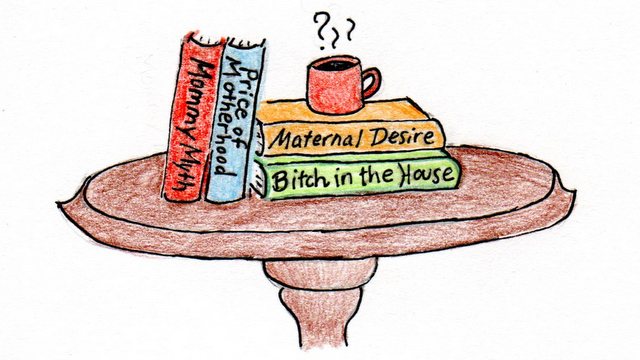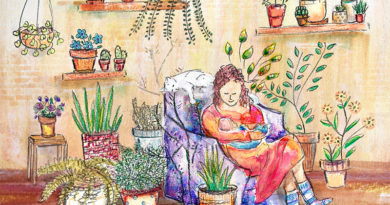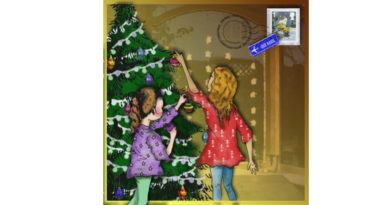Contemporary Mothering: A Review of Books
 I wrote this article about eight years ago, when my own children were around eight and five. All of these books are still in print, and all of these ideas and questions are as important today as they were then. If you don’t read about the books, do at least scroll to the end for some final thoughts and a humane passage on “maternal rage” from Anne Lamott.
I wrote this article about eight years ago, when my own children were around eight and five. All of these books are still in print, and all of these ideas and questions are as important today as they were then. If you don’t read about the books, do at least scroll to the end for some final thoughts and a humane passage on “maternal rage” from Anne Lamott.
Being a mother today can be complicated, entailing more than just having some children and settling in to rear them. We have to think about it, talk about it, question it, organize it, agonize over it, analyze it….and there are many, many books out there written by women who are doing all of those things and more. It is clear to me that many mothers would like to understand this occupation/state of being as deeply as possible, before it runs away with them.
Here I will discuss some books that women and mothers may enjoy reading. All of these books address topics that occupy us: childbearing, childcare, child rearing (and the blessing/problem of being the primary parent), etc. As the audience for these books, we are fortunate to have the resources to consider such topics. We are well fed, warm in the winter, educated, relatively safe; we and the authors know and appreciate this. However, if you, too, have felt discontented and pondered the compromises involved in relationships, parenting/motherhood, and family economics, you will probably enjoy some or all of the following books.
The Mommy Myth: The Idealization of Motherhood and How It Has Undermined Women by Susan J. Douglas and Meredith W. Michaels. London: Free Press, 2004.
This book tackles the way the media helps create and sustain some myths about motherhood, promoting the “new momism.” The new momism is a sentimentalized view of motherhood that says, basically, that of course women should be completely fulfilled by motherhood, never mind such challenges as exhaustion and boredom that accompany it. It is a funny and cynical look at expectations and where they come from and how they affect mothers today. You will laugh out loud as the authors point out the absurdities of Celebrity Mom magazine profiles, nod in disgust at the Why We Have No Childcare chapter, and sigh with relief as you realize that you are not the only one who sees the absurdity of the Way Things Are. This is a lively book, quite enjoyable, and often has something meaningful to say.
The Price of Motherhood: Why the Most Important Job in the World Is Still the Least Valued, by Ann Crittenden. New York: Henry Holt and Co., 2001. ISBN 0-8050-6619-5
Child rearing is not valued in the American-style market economy. That is, the economy does not prioritize any of the tasks involved in the rearing of healthy, good citizens, because they do not show immediate profit, although they do ultimately benefit society, says Crittenden. Because of this attitude toward child rearing, the people who do it – like stay-at-home mothers or childcare workers – do not receive much respect from society as a whole. And they certainly do not receive Social Security benefits, but they should. Crittenden has done a huge amount of research for this book, and also delves into topics like how strong, independent mothers are good for children, and how depending on the husband/father for sole financial support of a nuclear causes huge problems financially if a marriage falls apart. The author is American, and she looks for a solution to some of the problems she discusses, finding good models in – not surprisingly – Sweden and – surprisingly – the American military.
Maternal Desire: On Children, Love, and the Inner Life, by Daphne de Marneffe. New York: Little, Brown and Company, 2004. ISBN 0-316-05995-1.
This book delves into something that we as a culture are not sure how to make time for or respect – that desire to bear and nurture children that makes you miss having a baby in your arms and causes you to ponder whether you should get pregnant just one more time. The aim of this book is not to argue for stay-at-home motherhood for everyone. Rather, it examines the role maternal desire plays in any mother’s life (regardless, by the way, of social class). De Marneffe is a psychologist with her own practice and a mother of three. This is probably the most academic of these four books, but is still a good read and has a lot to say about motherhood and the female psyche.
The Bitch in the House: 26 Women Tell the TRUTH About Sex, Solitude, Work, Motherhood, and Marriage. Cathi Hanauer, ed. New York, NY: Perennial, 2003. ISBN 0-06-093646-0.
This last is a book of personal essays, written by women out “in the field,” who are thinking deeply about the issues that confuse many of us nowadays: motherhood, careers, and relationships with men/husbands. 26 women wrote original pieces for this book about – well, about the cracks in between the worlds of home and work, ideals and reality. Wanting to be married, but not wanting to be a Wife; wanting to share childcare 50-50 with one’s husband, but wanting to feel like the “main” parent; wanting to be a focused career woman but haunted by the desire to be a nice “mommy” as well…these are some of the topics tackled in this highly readable book of post-feminist era pieces. I could not put it down once I picked it up: I was so relieved to hear the voices of these women who grapple with some of the same things that puzzle me.
Just as an aside, if you like reading about struggles of motherhood, you should probably give Anne Lamott a look (she is mentioned in at least two of the above books). I am a huge fan of this passage from her essay “Mother Rage: Theory and Practice,” which I read at Salon.com:
…when we blow up at our kids, we only think we’re going from 0 to 60 in one second. Our surface and persona is so calm that when the problem first begins, we sound in control when we say, “Now, honey, stop that,” or “That’s enough.” But it’s only an illusion. Because actually, all day we’ve been nursing anger toward the boss or boyfriend or mother, but because we can’t get mad at nonkid people, we stuff it down; we keep going without blowing up because we don’t want to lose our jobs or partners or reputations. So when the problem with your kid starts up, you’re actually starting at 59….
Parenting is a joyous, necessary and complex undertaking in this postmodern, post-feminist culture. I am not convinced that our societies, with their emphasis on the nuclear family, give us the best support in our parenting. I am interested to see where we are going, and what I can do to help us get there, and will continue to keep up with this dialogue by reading these books and the many more to come.
Text and illustration by Carol McDonald
Carol has been living, working, and parenting in Zurich since November 1998. Her children are now 16 and 13.
© Copyright. Carol McDonald. 2006, 2014. All rights reserved. No part of this article may be reproduced without the express consent of the author.



